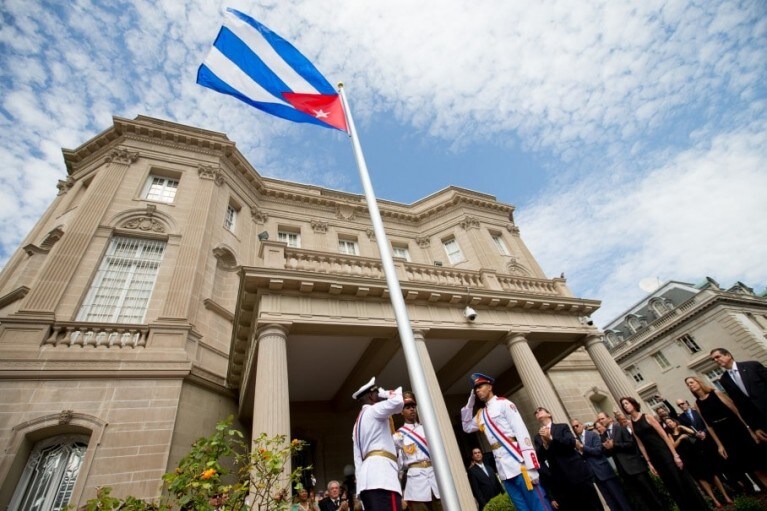Give Castro’s embassy in Washington the address it deserves
Rename 16th Street for a dissident who died under mysterious circumstances.

We all want a free, democratic and prosperous Cuba at peace with the United States. But this is not what Fidel and Raúl Castro want. Raul has made it clear that Cuba will remain under the control of the Communist Party and will not change the nature of the regime. As Josefina Vidal, director of U.S. affairs for the Cuban Foreign Ministry, put it: “Decisions on internal matters are not negotiable and will never be put on the negotiating agenda.” This is why the Cuban government refused to offer any meaningful political or economic reforms that might loosen its stranglehold on power, such as democratic elections or the release of all prisoners of conscience.
Despite good intentions, the U.S. policy shift morally and financially bolsters the Communist Party and disheartens people — both here and in Cuba — who have fought for freedom and prosperity. America’s recognition of the Castro regime legitimizes the party’s rule and makes continuity of party control more, not less, likely after Raul’s retirement or death. Victims of the Castro regime feel they have lost their staunchest ally, the United States. During an audience with Congress, dissident Jorge Luis Garcia Pérez — commonly known as Antúnez — said the majority of Cuba’s dissidents consider the negotiations between Washington and Havana a betrayal that threatens Cuban people’s aspirations for freedom.
People who oppose the rapprochement appear powerless. Easing the embargo bails out the party by letting it broker deals with U.S. corporate investors while choosing which Cubans get to do business with Americans. Tourism dollars coming from the United States will open a new revenue stream for the Cuban military, which owns the largest hotel conglomerate in Latin America and the Caribbean and most of the hotels on the island. Its parent company is run by Castro’s son-in-law, Luis Alberto Rodriguez López-Callejas.
The monopoly of power and money that senior Communist Party members enjoy is maintained by repressive measures against ordinary Cubans who dare challenge the ongoing tyranny. According to Amnesty International, Cuba still stifles “freedoms of expression, association and assembly.” The rights group’s investigations reveal that, in the past year, “the number of short-term arrests increased sharply and politically motivated criminal prosecutions continued.” According to a 2013 report by Human Rights Watch, Cuba still condones beatings and arbitrary arrests of its political opponents.
Although U.S. Secretary of State John F. Kerry noted last week in Havana that rapprochement “doesn’t mean that we should or will forget the past,” he failed to mention the injustices and the victims of Cuba’s Communist Party. The Castro regime is responsible for the deaths of about 10,000 Cubans. He ignored the dozens of political prisoners still held captive today. These artists, journalists, scholars, religious leaders and dissidents are in prison because their creativity, cause or conscience is deemed a threat by the Castro regime — the longest-running military dictatorship in the Western Hemisphere.
To keep the memory of the regime’s victims alive, Congress can rename Washington’s 16th Street Northwest, where the newly reopened embassy sits. Sen. Ted Cruz (R-Tex.) introduced a bipartisan bill to rename it for Payá, an activist who was expelled from the state-run university in 1972 for practicing Christianity. (Cuba does not condone the free expression of religion.) Payá went on to become one of the most prominent activists for democratization in Cuba and one of the biggest irritants to the Castro regime. You could consider him the Václav Havel of Cuba.
On July 22, 2012, Payá was killed in a car accident in the island’s Granma province under mysterious circumstances. The Human Rights Foundation, which conducted an examination of the case, concluded this year that “evidence, which was deliberately ignored, strongly suggests that the events of July 22, 2012, were not an accident, but instead the result of a car crash directly caused by agents of the state.”
Renaming the Cuban Embassy’s D.C. address as No. 1 Oswaldo Payá Way would not reverse President Obama’s decision to restore diplomatic relations with Cuba, but it would be a visible reminder that the United States supports the hopes and aspirations of Cuba’s dissidents, too.
There is precedent for such a move. In 1984, the U.S. government renamed the street in front of the Russian Embassy for the famed Soviet dissident Andrei Sakharov. The message that the U.S. government intended to send was that we remember those still struggling against oppression and despair in an imprisoned nation, even if we engage in open diplomacy with its government.
Cuba could retaliate, of course, by naming the street in front of the newly reopened U.S. Embassy in Havana for the late Venezuelan leader Hugo Chávez or whistleblower Edward Snowden or revolutionary Che Guevara or one of the 70 fugitives from U.S. law still harbored by the regime. But that decision would cast into even sharper relief our governments’ differing values.
Neither peaceful relations with Cuba nor a brighter future for the Cuban people will be achieved by ignoring the bloody and ongoing abuses of the Castro regime. This is how to remember them.
Marion Smith is executive director of the Victims of Communism Memorial Foundation.

